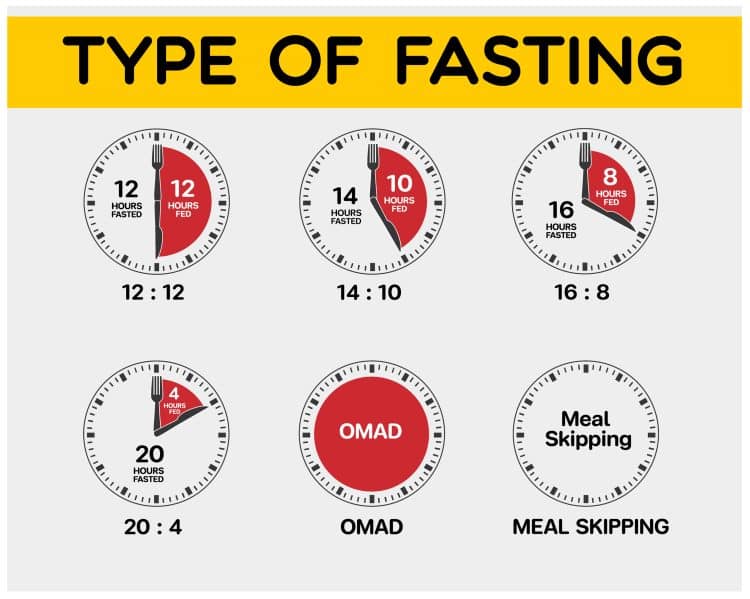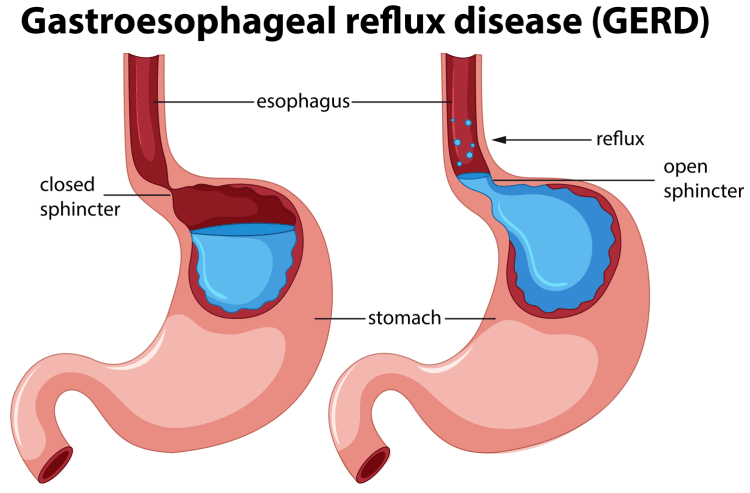In recent years, an increasing number of people have tried to adopt different fasting diets, as these have been proven to offer several health benefits, including weight loss. Doctors and healthcare professionals worldwide also recommend fasting diets to patients with obesity and excess body fat-related complications.
Studies suggest fasting diets can prevent serious health complications, like type-2 diabetes, coronary heart disease, stroke, and cancer. [1]
In this article, we will not primarily discuss fasting but rather throw some light on a common fasting-related side effect known as acid reflux.
Calculate Your Autophagy Timeline
Find out exactly when your body enters autophagy based on your unique profile, diet, and fasting protocol.
Calculate My Autophagy Window →Acid reflux, or gastroesophageal reflux, is a gastrointestinal problem associated with symptoms like heartburn, acid formation, and regurgitation. This article will discuss the reasons and symptoms related to acid reflux. Further, we will determine if fasting diets cause acid reflux. Alternatively, we will suggest ways to prevent acid reflux episodes.
What is Intermittent Fasting?
Before getting into intermittent fasting and its relation to acid reflux, we must understand how IF works. Fasting diets involve consuming food within a set window and fasting for the rest of the day. This type of fasting diet is also known as a time-restrictive diet, where the focus is on the eating and fasting window duration instead of calorie restriction.
When we consume food, our body starts to break it down in the digestive system and converts it to energy (glucose). This glucose is then converted into glycogen and stored in the liver, where it is periodically used as energy or to maintain overall homeostasis.
When there is an excess of glycogen in the liver, our body converts it into fat and stores it in the different fat reserves of the body. This fat accumulation generally leads to weight gain and obesity. While fasting, our body constantly needs the energy to perform essential tasks and maintain homeostasis.
During the early phase of the fast, the body quickly uses up all the stored glycogen from the liver. This leads to an energy deficiency, where the body is forced to break down the different fat resources of the body to produce energy. This process is known as ‘ketosis’ and is the primary reason for fat loss while fasting.
Throughout the fasting process, our digestive system, including the stomach, is empty for prolonged durations. This is often the root cause of stomach acid formation, eventually leading to acid reflux.
What Causes Acid Reflux?
Acid reflux is a common yet uncomfortable situation where excess acidic stomach enzymes or undigested food travels back up the esophagus. This often leads to severe heartburn sensations and general discomfort.
Healthcare professionals believe fatty, unhealthy food items often trigger acid reflux, and it is most prevalent among obese people. Furthermore, excessive smoking and some medications can also trigger acid reflux. Constant acid reflux episodes are often chronic and known as gastroesophageal reflux disease (GERD).
Can Intermittent Fasting Cause Acid Reflux?
Now that we know the workings of intermittent fasting and acid reflux, the question arises: does intermittent fasting cause acid reflux? The answer to this question is yes and no. Confused? As we all know, individuals react to certain things in unpredictable ways, so it is difficult to state conclusively whether intermittent fasting can cause acid reflux.
Still, some people do suffer from acid reflux while fasting. It is because our stomach is often empty during fasting hours, but the digestive system is active. Studies suggest that thinking about food can trigger the stomach to produce more acid. [2]
This means the stomach accumulates acidic digestive juices, which can spill over into the esophagus and cause gastroesophageal reflux.
The other aspect of intermittent fasting and acid reflux is related to breaking the fast. During the eating window, many people go overboard and consume unhealthy foods, which can also cause indigestion and acid reflux.
It is important to note that acid reflux due to fasting is often noticed in people new to intermittent fasting. Many healthcare professionals believe that as our bodies get used to fasting, we can completely prevent acid reflux episodes. Some studies also believe intermittent fasting can help cure gastroesophageal reflux disease (GERD).
How to Avoid Acid Reflux While Fasting?
As mentioned above, acid reflux while fasting is not something everyone experiences. Furthermore, healthcare professionals believe you can manage acid reflux while fasting by taking proper precautions. Here are some tips to help avoid gastroesophageal reflux episodes while fasting.
Drink Water
Staying hydrated during the fasting period is very important, as most intermittent fasting diets allow zero-calorie drinks. Hence, it is suggested to stay hydrated during the fasting period. Warm water can also help maintain the stomach’s acid levels, which can help with acid reflux.
Related: Water Intake Calculator
Avoid Acidic Fruits
Citrus fruits like oranges, lemons, and tangerines have a high acid content. People who consume these fruits during the eating window may experience acid reflux episodes while fasting. Hence, you must avoid or restrict these food items while fasting.
Eat Slowly
Many fasters tend to stuff food into their mouths as soon as the fasting period ends. This is a terrible habit, as these people often do not properly chew their food before swallowing. This can lead to improper digestion and acid reflux in the worst cases. So it is advised to slowly and mindfully chew food before swallowing, which prevents GERD and keeps you satiated.
Avoid Fatty and Fried Foods
Fatty and fried foods are often the chief reason for acid reflux among normal people and those following fasting diets. This is because fatty foods are difficult to digest, sometimes leading to acid reflux and heartburn. Those who follow fasting diets must avoid fried and spicy foods immediately before and after a fast.
Stay Up After Eating
Now, this might sound trivial, but lying right after eating can force the food back into the esophagus. Hence, you must stay upright for a while after eating; this means no immediate napping after a meal. You can also try brisk walking after eating to aid the settling of the food in the stomach.
Sleep on an Incline
Generally, it is suggested that you keep your head higher than your feet while sleeping. This advice can also help people who are struggling with acid reflux. You can use pillows to prop your head while sleeping.
Avoid Certain Drinks
People who consume excess coffee and carbonated drinks can experience frequent acid refluxes. Hence, it is better to avoid these drinks while fasting. Sparkling water can also cause acid reflux, so it is better to consume still or flat water while fasting.
Check Your Medications
Some common medicines, like non-steroidal anti-inflammatory drugs (NSAID), can irritate the esophagus and even relax the sphincter muscle. This muscle generally prevents the food in the stomach from reaching back into the esophagus. Hence, taking these medicines while fasting can cause gastroesophageal reflux (GER).
Cut Down on Smoking
Smoking is a major cause of acid reflux. The nicotine found in cigarettes can relax the esophageal sphincter muscle, causing undigested food and acid to reach back up the esophagus, causing heartburn and acid reflux.
Drink Chamomile and Ginger Tea
Studies suggest that chamomile and ginger have anti-inflammatory properties. Hence, including these herbal teas in your fasting diet can help with acid reflux. [3, 4]
Other Benefits of Intermittent Fasting
Let us take a closer look at some of the important benefits of intermittent fasting and time-restricted eating in general.
Weight Loss
People who are generally overweight or are dealing with obesity can try fasting diets, as studies suggest fasting can help them shed those extra pounds. This is because fasting is proven to trigger ketosis, which forces the body to break down fat and use it as an energy source. Additionally, time-restricted eating is a wonderful way to restrict excess calories and cut down on junk food.

Fasting May Improve Heart Health
Fasting does not directly affect the human heart. Still, some preliminary studies suggest that fasting positively affects factors responsible for heart health, such as blood cholesterol, triglycerides, blood sugar, etc. Fasting is great for people struggling with high cholesterol levels. Studies prove that fasting reduces bad cholesterol and increases good HDL cholesterol levels. [5]
Prevent Inflammation
Inflammation is the body’s natural defense against internal infections and diseases. But frequent heightened inflammation levels can release free radicals into the bloodstream. An excess of free radicals can be harmful to the body as it causes oxidative stress. Some studies suggest that fasting can flush out these free radicals and improve our overall health. [6]
May Boost Brain Health
Scientists believe that ketones produced during ketosis help boost brain performance. Additionally, fasting has been linked with synthesizing the brain-derived neurotrophic factor (BDNF) hormone. Lower levels of BDNF are a chief cause of depression among adults. [7]
Improves Insulin Sensitivity
Type-2 diabetes has become a major headache for healthcare professionals across the globe. Obesity and poor insulin sensitivity are often regarded as the most common factors that cause type-2 diabetes. Intermittent fasting is proven to tackle both of these problems effectively. By following a time-restricted diet, people can not only reverse obesity but also control irregular insulin spikes.
Slows Down Ageing
Fasting for prolonged durations has been proven to cause cellular autophagy. Cell autophagy is the process by which the cells of our body start eating the dead and diseased cells and cell organelles. The consumed cells are then replaced by young cells. This phenomenon slows down the body’s overall aging process. Cell autophagy also leads to the elimination of several disease-causing cells and organelles.
Frequently Asked Questions
1. Can fasting make acid reflux worse?
People who are new to fasting often suffer from frequent acid reflux symptoms. These symptoms are temporary and are often resolved as you get used to the fasting process.
2. How can I stop acid reflux while fasting?
Acid reflux while fasting is a temporary irritation that lifestyle changes can fix. These changes include reducing fatty food consumption, avoiding acidic fruits, and reducing smoking and alcohol. You can also drink more water, sleep in the right position, and drink chamomile and ginger-based teas.
3. Why does fasting cause acid reflux?
Fasting involves having an empty stomach for prolonged periods. This can often lead to an acidic buildup in the stomach, which can spill over into the esophagus and cause acid reflux and heartburn.
Final Thoughts
Acid reflux while fasting can temporarily irritate anyone. Several subtle lifestyle changes can help reduce acid reflux and completely cure it. Fasting diets have several associated benefits, and you should not shy away from them because of these temporary acid reflux episodes.
References
Fitness Volt is committed to providing our readers with science-based information. We use only credible and peer-reviewed sources to support the information we share in our articles.
- Arnason, T. G., Bowen, M. W., & Mansell, K. D. (2017, April 15). Effects of intermittent fasting on health markers in those with type 2 diabetes: A pilot study. PubMed Central (PMC).
- Role of thought, sight, smell, and taste of food in the cephalic phase of gastric acid secretion in humans – PubMed. (1986, February 1). PubMed.
- Yeh, A. M., & Golianu, B. (2014, August 18). Integrative Treatment of Reflux and Functional Dyspepsia in Children. PubMed Central (PMC).
- Srivastava, J. K., Shankar, E., & Gupta, S. (n.d.). Chamomile: A herbal medicine of the past with bright future. PubMed Central (PMC).
- DONG, T. A., SANDESARA, P. B., DHINDSA, D. S., MEHTA, A., ARNESON, L. C., DOLLAR, A. L., TAUB, P. R., & SPERLING, L. S. (2020, April 21). Intermittent Fasting: A Heart Healthy Dietary Pattern? PubMed Central (PMC).
- H., Pizzino, G., Irrera, N., Cucinotta, M., Pallio, G., Mannino, F., Arcoraci, V., Squadrito, F., Altavilla, D., & Bitto, A. (2017, July 27). Oxidative Stress: Harms and Benefits for Human Health. Oxidative Stress: Harms and Benefits for Human Health.
- Björkholm, C., & Monteggia, L. M. (2015, November 11). BDNF — a key transducer of antidepressant effects. PubMed Central (PMC).
Tip: If you're signed in to Google, tap Follow.












